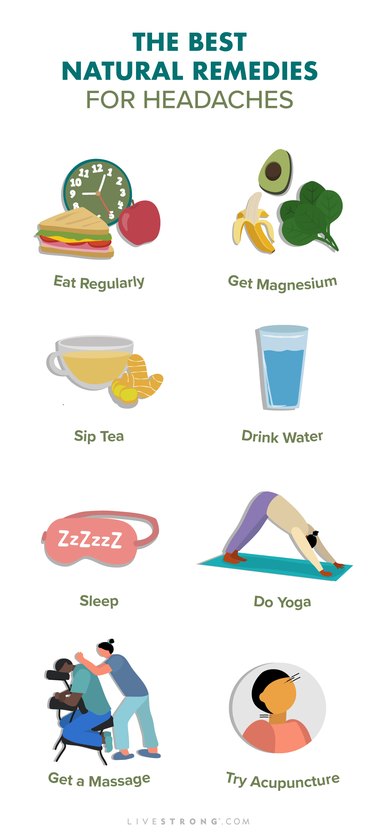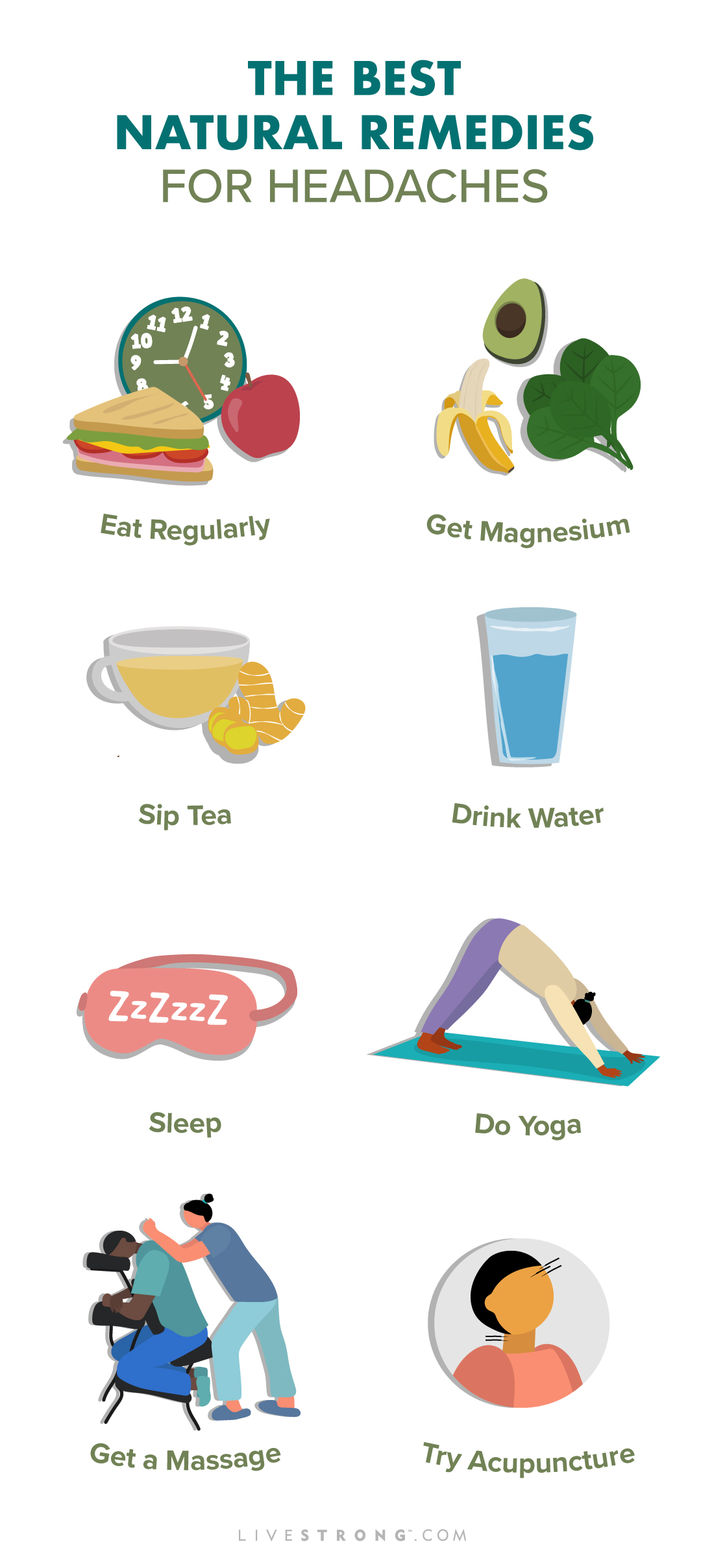Headaches can be relieved using natural remedies like ginger and peppermint essential oil. These remedies have been found to be effective in providing relief from headache symptoms.
Ginger can help reduce inflammation and alleviate pain, while peppermint essential oil has a soothing and cooling effect.

Credit: www.netmeds.com
Understanding Headaches
Headaches are a common ailment that many of us experience at some point or another. They can be debilitating and interfere with our daily lives, making it difficult to focus and concentrate. Understanding the different types of headaches and their causes is the first step towards finding natural remedies that can alleviate or even prevent these painful episodes.
Types Of Headaches
Headaches can be classified into several different types, each with its own distinct features and symptoms:
- Tension headaches: This is the most common type of headache that people experience. It is characterized by a dull, achy pain that wraps around the head like a tight band. Tension headaches are often caused by stress, muscle tension, or poor posture.
- Migraine headaches: Migraine headaches are more severe and debilitating than tension headaches. They are often accompanied by throbbing pain, sensitivity to light and sound, and nausea. Migraines can last for hours or even days and are often triggered by specific factors such as certain foods, hormonal changes, or changes in the environment.
- Cluster headaches: Cluster headaches are rare but extremely painful. They typically occur in cyclical patterns, with clusters of headaches lasting for weeks or months, followed by periods of remission. Cluster headaches are often characterized by intense, piercing pain on one side of the head, along with symptoms such as redness in the eye, nasal congestion, and tearing.
- Sinus headaches: Sinus headaches are caused by inflammation or infection in the sinuses, resulting in pain and pressure in the forehead, cheekbones, and bridge of the nose. They are often accompanied by symptoms such as congestion, facial swelling, and a runny or stuffy nose.
Causes Of Headaches
The exact cause of headaches can vary depending on the type. However, there are several common triggers that can contribute to the onset of a headache:
- Stress: Stress is a major contributing factor in the development of tension headaches. High levels of stress can lead to muscle tension and tightness in the neck and scalp, resulting in a headache.
- Dietary factors: Certain foods and beverages can trigger migraines in susceptible individuals. Common culprits include caffeine, alcohol, chocolate, aged cheeses, and foods that contain nitrites or monosodium glutamate (MSG).
- Sleep disturbances: Lack of sleep or poor sleep quality can increase the likelihood of experiencing a headache. Both insomnia and excessive sleep can be triggers for migraines and tension headaches.
- Environmental factors: Bright lights, loud noises, strong smells, and changes in weather conditions can all contribute to the onset of a headache.
- Hormonal changes: Fluctuations in hormone levels, particularly in women during their menstrual cycle or menopause, can trigger migraines.
By understanding the different types of headaches and their causes, you can begin to explore natural remedies that target the underlying factors contributing to your headaches. In the upcoming sections, we will delve deeper into specific natural remedies for each type of headache, providing you with effective solutions for finding relief and preventing future episodes.
Natural Remedies For Headaches
Discover effective natural remedies for headaches that provide relief without the use of medication. From herbal teas to aromatherapy, these remedies offer a holistic approach to managing and alleviating headache pain.
Natural remedies for headaches can offer effective relief without the need for medication. These alternative approaches focus on addressing the root cause of the pain and promoting overall well-being. In this article, we will explore three categories of natural remedies for headaches: herbal remedies, lifestyle changes, and alternative therapies.Herbal Remedies
Herbal remedies have been used for centuries to relieve headaches and provide a natural method for managing pain. Here are a few herbs that have shown promise in alleviating headaches: 1. Butterbur: This herb has anti-inflammatory properties and may reduce the frequency and intensity of migraines. It is important to choose a butterbur extract that is free of pyrrolizidine alkaloids, as they can be toxic to the liver. 2. Feverfew: Feverfew is known for its ability to prevent migraines and reduce their severity. It works by inhibiting the release of inflammatory substances in the body. However, it should not be used by pregnant women or individuals taking blood-thinning medications. 3. Peppermint: Peppermint oil has a cooling effect that can help ease tension headaches. Applying a diluted peppermint oil blend to the temples may provide relief. Additionally, sipping on peppermint tea can help relax the muscles and soothe the mind.Lifestyle Changes
Making simple lifestyle changes can greatly reduce the frequency and intensity of headaches. Consider incorporating the following habits into your daily routine: 1. Adequate hydration: Dehydration can trigger headaches, so it is essential to drink enough water throughout the day. Aim to drink at least eight glasses of water daily to stay hydrated. 2. Regular exercise: Engaging in moderate physical activity, such as walking, swimming, or yoga, can help reduce the frequency and severity of headaches. Exercise promotes the release of endorphins, which act as natural painkillers. 3. Stress management: Stress is a common trigger for headaches. Implementing stress management techniques, such as deep breathing exercises, meditation, or engaging in hobbies, can help alleviate tension and prevent headaches.Alternative Therapies
Alternative therapies can offer relief from headaches by addressing the underlying imbalances in the body. Consider trying the following methods: 1. Acupuncture: This ancient practice involves the insertion of thin needles into specific points on the body. Acupuncture has been shown to reduce headache frequency and intensity by promoting the flow of energy and balancing the body. 2. Massage therapy: Massage can help relieve muscle tension and reduce stress, both of which can contribute to headaches. A skilled therapist can target specific areas of tension in the head, neck, and shoulders to provide relief. 3. Biofeedback: Biofeedback techniques teach individuals how to control physiological responses, such as muscle tension and heart rate. By learning to monitor and adjust these responses, headaches can be prevented or minimized. Incorporating these natural remedies into your lifestyle can provide relief from headaches and promote overall well-being. Remember to consult with a healthcare professional before trying any new remedies, especially if you are pregnant or have any underlying medical conditions. With proper care and attention to your body, you can find effective, natural ways to manage and prevent headaches.Prevention And Management
Suffering from frequent headaches can be both frustrating and debilitating. Luckily, there are several natural remedies that can help to prevent and manage these pesky head pains. By implementing preventive measures and knowing when to seek medical help, you can effectively manage your headaches without relying on pharmaceutical interventions. Additionally, utilizing natural remedies can provide a holistic approach to alleviating head pain. In this article, we will discuss preventive measures, when to seek medical help, and managing headaches with natural remedies.
Preventive Measures
If you are prone to getting headaches, taking proactive steps to prevent them can significantly reduce their occurrence and intensity. Here are some preventive measures you can incorporate into your daily routine:
- Avoid triggers: Identify and eliminate any triggers that tend to cause your headaches. Common triggers include stress, certain foods, lack of sleep, and dehydration.
- Maintain a regular sleep schedule: Getting enough sleep on a consistent basis can help prevent headaches. Aim for 7-8 hours of quality sleep each night.
- Practice stress management techniques: Chronic stress can contribute to headaches. Engage in stress-reducing activities like yoga, meditation, deep breathing exercises, or hobbies that help you relax.
- Stay hydrated: Dehydration is a common trigger for headaches, so make sure to drink enough water throughout the day. A general guideline is to consume at least eight 8-ounce glasses of water daily.
- Exercise regularly: Regular physical activity has been shown to reduce the frequency and severity of headaches. Aim for at least 30 minutes of moderate exercise most days of the week.
When To Seek Medical Help
While natural remedies can be effective for managing most headaches, there are certain situations when medical help should be sought. Consider consulting a healthcare professional if:
- Your headache symptoms change suddenly or become significantly worse
- Your headaches are accompanied by other symptoms such as fever, stiff neck, confusion, or difficulty speaking
- Your headaches are triggered by physical exertion, coughing, or bending over
- You have a history of head injuries or recent trauma
- Over-the-counter pain relievers or natural remedies do not provide relief
Remember, it’s always better to err on the side of caution and seek medical advice if you have any concerns or doubts about your headaches.
Managing Headaches With Natural Remedies
If your headaches are not severe or accompanied by alarming symptoms, natural remedies can be an effective way to manage them. Here are some natural remedies you can try:
- Applying a cold or warm compress to your forehead or neck
- Practicing relaxation techniques such as progressive muscle relaxation or guided imagery
- Using essential oils like peppermint or lavender for aromatherapy
- Engaging in regular exercise, which can help release endorphins and reduce headache intensity
- Trying natural supplements like magnesium, riboflavin, or feverfew, which have been shown to help prevent migraines
Remember, the effectiveness of natural remedies may vary from person to person, so it’s important to find what works best for you through trial and error. Be sure to discuss any new remedies or supplements with your healthcare provider to ensure they are safe and suitable for your specific circumstances.

Credit: modernhippiehabits.com

Credit: www.livestrong.com
Frequently Asked Questions On Natural Remedies For Headaches
How Do You Cure A Headache Naturally?
To naturally cure a headache, try drinking plenty of water, applying a cold or hot compress, practicing relaxation techniques, such as deep breathing or meditation, getting enough sleep, and avoiding triggers like stress, caffeine, and bright lights.
What Herb Is Best For Headaches?
The herb best for headaches is feverfew.
How Do I Stop A Headache Fast?
To stop a headache quickly, try these remedies: take an over-the-counter pain reliever, apply a cold or hot compress to your head, drink plenty of water, practice relaxation techniques like deep breathing or meditation, and rest in a dark, quiet room.
These methods can provide fast relief from headaches.
What Drink Is Good For Headaches?
A cup of ginger tea or chamomile tea can help to relieve headaches.
Conclusion
Natural remedies for headaches offer a safe and effective way to relieve symptoms and improve quality of life. From herbal teas to essential oils, these options provide a holistic approach to managing headaches. By incorporating these natural remedies into your routine, you can experience relief without the worry of excessive medication use.
Remember to consult with a healthcare professional before starting any new treatment. Embrace the power of nature to alleviate your headaches and enjoy a healthier, more balanced life.
